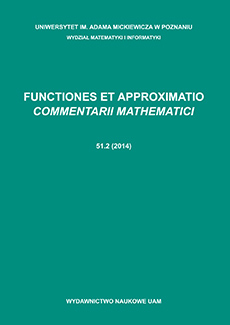Abstract
Let $\theta(q)=1+2\sum_{\nu=1}^{\infty} q^{\nu^2}$ denote the Thetanullwert of the Jacobi Zeta function \[\theta(z|\tau) =\sum_{\nu=-\infty}^{\infty} e^{\pi i\nu^2\tau + 2\pi i\nu z}.\] For algebraic numbers $q$ with $0<|q|<1$ we prove the algebraic independence over $\mathbb{Q}$ of the numbers $\theta(q^n)$ and $\theta(q)$ for $n=2,3,\dots,12$ and furthermore for all $n\geq 16$ which are powers of two. An application for $n=5$ proves the transcendence of the number \[\sum_{j=1}^{\infty} {(-1)}^j \Big( \frac{j}{5}\Big) \frac{jq^j}{1-q^j}.\] Similar results are obtained for numbers related to modular equations of degree 3, 5, and 7.
Citation
Carsten Elsner. "Algebraic independence results for values of theta-constants." Funct. Approx. Comment. Math. 52 (1) 7 - 27, March 2015. https://doi.org/10.7169/facm/2015.52.1.1
Information





